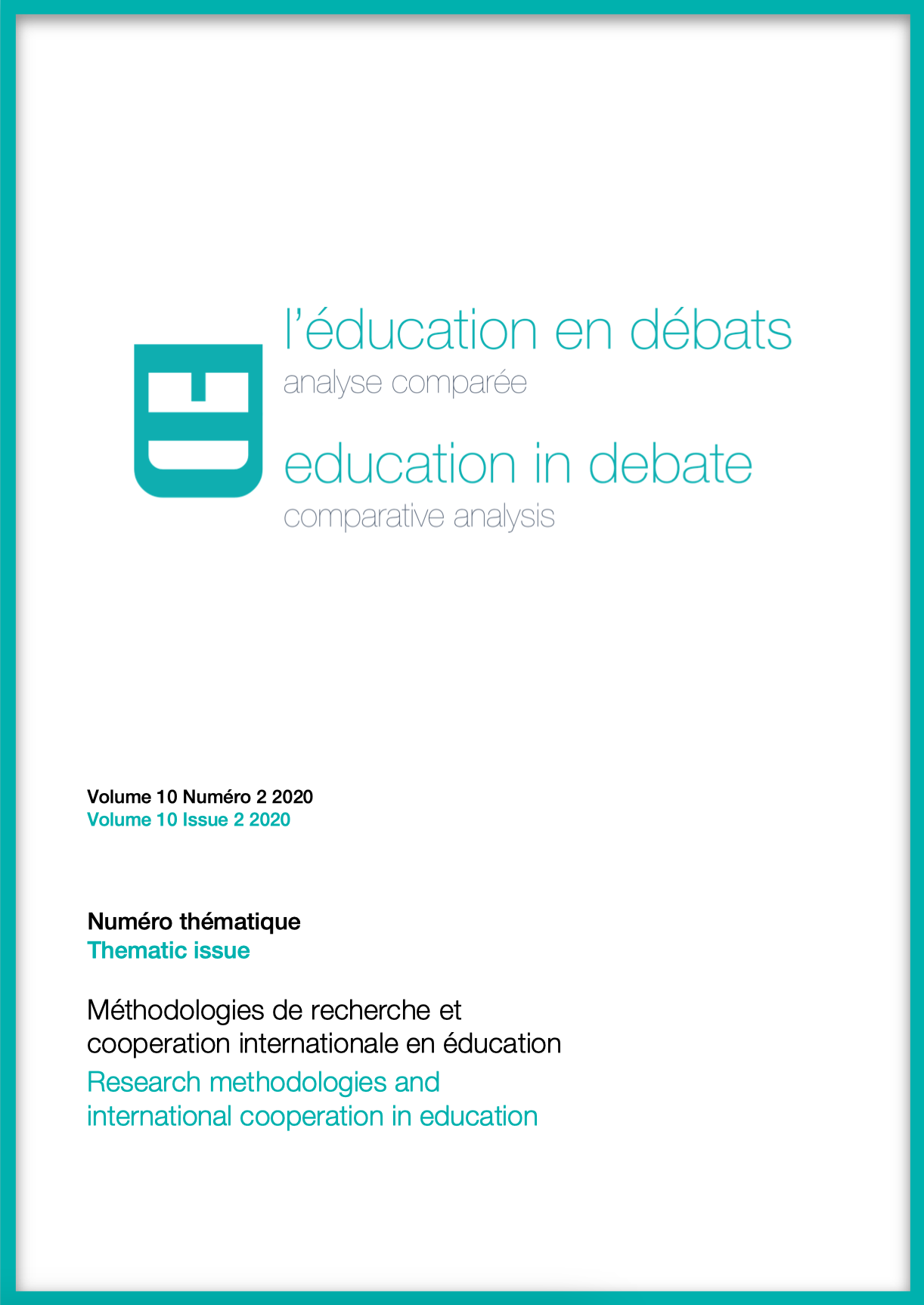Éditorial. Méthodologies de recherche et coopération internationale en éducation
DOI :
https://doi.org/10.51186/journals/ed.2020.10-2.e340Références
Blessinger, P., & Bliss, T. J. (2016). Introduction to Open Education: Towards a Human Rights Theory. In P. Blessinger, & T. J. Bliss (Eds.), Open Education. International Perspectives in Higher Education (p. 11-30). Cambridge: Open Book Publishers.
Boekholt, P., Edler, J., Cunningham, P., & Flanagan, K. (2009). Drivers of International Collaboration in Research. Brussels: European commission. https://ec.europa.eu/research/iscp/pdf/publications/drivers_sti.pdf
Class, B., Schneider, D., Laroussi, M., & Lombard, F. (2016). Enseigner la méthodologie de la recherche en technologie éducative : des conceptions aux concepts seuils. Distances et médiations des savoirs, 13, 2-17. https://doi.org/10.4000/dms.1349
Earley, M. (2014). A synthesis of the literature on research methods education. Teaching in Higher Education, 19(3), 242-253. https://doi.org/10.1080/13562517.2013.860105
Flanagan, K. (2015). International Mobility of Scientists. In D. Archibugi, & A. Filippetti (Eds.), The Handbook of Global Science, Technology, and Innovation (p. 364-381). Chichester: John Wiley & Sons, Ltd.
Gaillard, A.-M., & Gaillard, J. (2017). Caractéristiques et déterminants des collaborations scientfiques entre le Maroc et l’Europe: une enquête questionnaire. In H. Bouabid, & J. Gaillard (Eds.), La recherche scientifique au Moroc et son internationalisation (p. 201-232). Saarbrücken: Éditions universitaires européennes.
Hameline, D. (2001). In memoriam Michael A. Huberman (1940-2001). Revue française de pédagogie, 137, 183-185.
Huisman, J., Adelman, C., Hsieh, C., Shams, F., & Wilkins, S. (2012). Europe’s Bologna process and its impact on global higher education. In D. K. Deardorff, H. D. Wit, & J. D. Heyl (Eds.), The SAGE Handbook of International Higher Education (p. 81-100). Thousand Oaks, CA: SAGE Publications, Inc. https://doi.org/10.4135/9781452218397
Kidd, I., Medina, J., & Pohlhaus, G. (Eds.). (2017). The Routledge Handbook of Epistemic Injustice. New York, NY: Routledge.
Kilburn, D., Nind, M., & Wiles, R. (2014). Learning as Researchers and Teachers: The Development of a Pedagogical Culture for Social Science Research Methods? British Journal of Educational Studies, 62(2), 191-207. https://doi.org/10.1080/00071005.2014.918576
Kiley, M., & Wisker, G. (2009). Threshold concepts in research education and evidence of threshold crossing. Higher Education Research & Development, 28(4), 431-441. https://doi.org/10.1080/07294360903067930
Lewthwaite, S., & Nind, M. (2016). Teaching Research Methods in the Social Sciences: Expert Perspectives on Pedagogy and Practice. British Journal of Educational Studies in Continuing Education, 64(4), 413-430. https://doi.org/10.1080/00071005.2016.1197882
Loiola, F., & Kaddouri, M. (2016). La formation à la recherche aux cycles supérieurs : finalités, usages et enjeux. Le cas des sciences de l’éducation. TransFormations, 15-16, 1-6.
Meyer, C., Shanahan, J., & Laugksch, R. (2005). Students’ Conceptions of Research: A qualitative and quantitative analysis. Scandinavian Journal of Educational, 49(3), 225-244.
Meyer, J., Land, R., & Baillie, C. (2010). Threshold Concepts and Transformational Learning (vol. 42). Rotterdam: Sense Publishers.
Mishra, P., & Koehler, M. (2006). Technological Pedagogical Content Knowledge: A Framework for Teacher Knowledge. Teachers College Record, 108(6), 1017-1054.
Nind, M. (2020). A new application for the concept of pedagogical content knowledge: teaching advanced social science research methods. Oxford Review of Education, 46(2), 185-201. https://doi.org/10.1080/03054985.2019.1644996
Nind, M., & Lewthwaite, S. (2018a). Hard to teach: inclusive pedagogy in social science research methods education. International Journal of Inclusive Education, 22(1), 74-88. https://doi.org/10.1080/13603116.2017.1355413
Nind, M., & Lewthwaite, S. (2018b). Methods that teach: developing pedagogic research methods, developing pedagogy. International Journal of Research & Method in Education and Information Technologies, 41(4), 398-410. https://doi.org/10.1080/1743727X.2018.1427057
Piron, F., Regulus, S., & Djiboune Madiba, M. S. (2016). Justice cognitive, libre accès et savoirs locaux. Pour une science ouverte juste, au service du développement local durable. Québec, QC : Science et bien commun.
Reeves, T. C., & Lin, L. (2020). The research we have is not the research we need. Educational Technology Research and Development, 68(4), 1991-2001. https://doi.org/10.1007/s11423-020-09811-3
Shulman, L. (1987). Knowledge and teaching: Foundations of the new reform. Harvard Educational Review, 57(1), 1-22.
Usher, R. (2018). Experiential learning. In K. Illeris (Ed.), Contemporary theories of learning (2e éd., p. 189-203). London: Routledge.
Van der Maren, J.-M., Brodeur, M., Gervais, F., Gilles, J.-L., & Voz, G. (2019). Référentiel pour la formation des chercheuses et des chercheurs francophones en éducation. Québec, QC: ADEREQ. http://hdl.handle.net/20.500.12162/2746
Van Merriënboer, J., & Kirschner, A. (2013). Ten steps to complex learning: a systematic approach to four-component instructional design (2e éd.). Vancouver, BC: Routledge.
Wagner, C., Garner, M., & Kawulich, B. (2011). The state of the art of teaching research methods in the social sciences: towards a pedagogical culture. Studies in Higher Education, 36(1), 75-88.
Wenger, E. (1998). Communities of Practice: Learning, Meaning, and Identity. Cambridge: Cambridge University Press.
Téléchargements
Publiée
Comment citer
Numéro
Rubrique
Licence
Certains droits réservés 2021 The Author(s)

Ce travail est disponible sous la licence Creative Commons Attribution 4.0 International .





